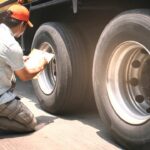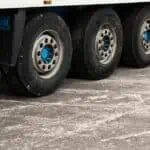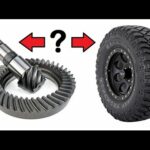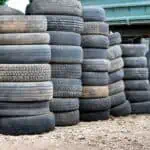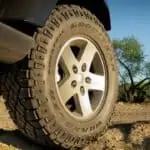Load Range F trailer tires are designed to provide the best possible load-carrying capacity and durability for heavy-duty trailers. They are made from a special compound that is resistant to wear and tear, and they feature reinforced sidewalls that can handle the weight of heavy loads. Load Range F tires are available in a variety of sizes, so you can find the perfect fit for your trailer.
If you’re pulling a trailer, you want to make sure you have the right tires. That’s why it’s important to know about load range F trailer tires.
Load range F trailer tires are designed for heavy-duty use.
They can handle more weight and stress than other types of tires. That means they’re perfect for trailers that are carrying a lot of weight.
If you’re looking for a tire that can handle your heavy-duty needs, then load range F is the way to go.
Trailer Tires: Determining Size and Load Range | TireBuyer.com
What Load Range is F?
Load range is a measure of how much weight a tire can safely carry. The higher the load range, the more weight the tire can carry. Load range is indicated by a letter, with “F” being the highest rating.
A tire with a load range of “F” can safely carry up to 1,800 pounds.
Is Load Range E Or F Better?
The answer to this question is not as simple as one might think. In fact, there are a number of factors that need to be considered when deciding which load range is best for a particular application. The first factor is the weight of the vehicle.
A heavier vehicle will require a higher load range tire in order to maintain proper handling and stability. The second factor is the type of terrain on which the vehicle will be operated. A vehicle that will see a lot of off-road use will need a tire with a higher load range in order to avoid damage from rocks and other obstacles.
The third factor is the speed at which the vehicle will be driven. A high-speed vehicle will need a tire with a higher load range in order to maintain traction and stability at high speeds.
So, taking all of these factors into consideration, which load range is better?
Ultimately, it depends on the specific application. If you are unsure about which load range would be best for your needs, consult with a qualified automotive technician or tire specialist.
What Ply is F Rated Tires?
There is no definitive answer to this question as it depends on the specific tire in question. However, most f rated tires are either 4-ply or 6-ply tires. This designation indicates the number of layers of tread and fabric that make up the tire, with more layers meaning a stronger and more durable tire.
So, if you’re looking for a tough and durable tire for your vehicle, an f rated tire is a good option.
What Does Load Range D Mean on a Trailer Tire?
Load range D on a trailer tire means that the tire is designed to carry a heavy load. The load range is determined by the size of the tire and the amount of weight it can carry.
235/80R16 Load Range F Trailer Tires
235/80R16 Load Range F Trailer Tires are designed for carrying heavy loads on trailers. They have a load range of F, which means they can carry up to 4,600 pounds per tire. These tires are made from durable materials and have a strong tread pattern that can grip the road well, even when hauling a heavy load.
If you’re looking for trailer tires that can handle a heavy load, then 235/80R16 Load Range F Trailer Tires are a great option.
225/75R15 Load Range F Trailer Tires
If you are in the market for new trailer tires, you may be wondering what load range to choose. A common option is the 225/75R15 load range F tire. In this post, we will take a closer look at what this load range means and whether it is right for your needs.
The 225/75R15 load range F tire is a popular choice for many trailers. This tire has a maximum load capacity of 2,540 pounds and can carry up to 80 psi of air pressure. The “F” in the name stands for “8-ply,” which means that the tire has eight layers of fabric in its construction.
This makes it a very durable option that can handle heavy loads without issue. One thing to keep in mind when choosing trailer tires is that they should always be rated higher than the max weight capacity of your trailer. This way, you will have a margin of safety in case you ever need to haul something heavier than usual.
With a 225/75R15 load range F tire, you can rest assured that your trailer will be able to handle whatever you need to throw at it.
Load Range F Tires for Sale
There are many factors to consider when purchasing tires for your vehicle. One important factor is the load range of the tire. The load range indicates the maximum amount of weight that the tire can safely carry.
Load Range F tires are designed to carry heavy loads, and are often used on trucks and other large vehicles. If you’re looking for Load Range F tires for sale, here are a few things to keep in mind.
First, make sure that you know the size of tire that you need.
You can find this information in your vehicle’s owner’s manual or on the doorjamb of your vehicle. Once you know the size, you can start shopping around for Load Range F tires that will fit your car or truck.
When comparing prices, be sure to look at the reviews for each tire before making a purchase.
This will help you get an idea of how well the tire performs and if there have been any safety issues reported with it. Also, be sure to ask about warranty information and return policies before buying anything.
Once you’ve found a few good choices, it’s time to make a decision!
Be sure to take into consideration how much weight your vehicle will be carrying, as well as any driving conditions you may encounter. With a little research, you should be able to find the perfect set of Load Range F tires for sale!
16 Trailer Tires Load Range F
If you’re shopping for new trailer tires, you may be wondering what the “load range” is and why it’s important. The load range is simply a measure of how much weight each tire can support. A higher load range means each tire can carry more weight.
For most trailers, a load range of “F” is ideal. This provides plenty of support for even the heaviest loads. Plus, tires with a higher load range tend to be more durable and last longer than those with a lower load range.
Of course, there are other factors to consider when choosing trailer tires. But if you’re looking for tires that can handle just about anything you throw at them, go with a load range of F.
Load Range G Trailer Tires
Load Range G trailer tires are designed to carry heavy loads and provide increased durability. They are typically used on trailers that carry large, heavy items such as RVs, boats, and horse trailers. Load Range G tires have a higher load capacity than standard passenger car tires, and they also have a thicker sidewall to help prevent damage from road debris.
When shopping for new tires, be sure to check the load range rating to ensure that you are getting the right tire for your needs.
Load Range F Tires Weight Rating
Load Range F Tires Weight Rating
Most passenger car tires have a load range of either Standard or Light. A few tires, mostly on light trucks, have a load range of Medium.
Load Range F tires are only used on very heavy duty vehicles, such as some commercial trucks. The weight rating for a Load Range F tire is 3520 pounds (1590 kg) per tire. This means that four of these tires can support a total weight of 14,080 pounds (6360 kg).
Load Range F All-Terrain Tires
When you’re driving on the road, you want tires that can provide a comfortable ride while also being able to grip the pavement. However, when you’re off-roading, you need tires that can handle different terrain, including mud, sand, and rocks. That’s where load range F all-terrain tires come in.
These tires are designed to provide a balance between on-road and off-road performance.
Load range F all-terrain tires typically have a tread pattern that includes large blocks or lugs. The lugs provide traction in off-road conditions, while the spaces between them allow for self-cleaning so that mud and dirt don’t build up on the tire.
The tread depth is also deeper on these tires than on regular passenger car tires. This helps to prevent punctures from rocks and other debris.
All-terrain tires typically have a harder compound than regular passenger car tires.
This gives them better wear resistance but can make them less comfortable to drive on paved roads.
17 Inch Load Range F Tires
17 Inch Load Range F Tires
When it comes to choosing the right tires for your vehicle, there are a lot of factors to consider. But one of the most important is load range.
This refers to the amount of weight that a tire can support safely. And when it comes to 17 inch load range F tires, you’ll want to choose ones that can handle plenty of weight.
So what exactly is a load range F tire?
These are designed to carry up to 3,195 pounds per tire. That’s a lot of weight! And if you’re looking for tires that can handle even more weight, you may want to consider load range G or H tires.
But for most people,load range F tires will be more than enough.
One thing to keep in mind is that not all 17 inch tires are created equal. So while some may have a load range of F, others may only have a load range of C or D. Be sure to check the specifications before making your purchase.
Otherwise, you could end up with tires that aren’t suitable for your vehicle or driving needs.
Conclusion
If you are shopping for new trailer tires, you may come across the term “load range.” Load range is simply a measure of how much weight the tire can safely carry. The higher the load range, the more weight the tire can handle.
There are two types of load ranges: standard and extra capacity. Standard load range tires are designed for trailers that weigh up to 3,000 pounds. Extra capacity tires can handle trailers that weigh up to 4,000 pounds.
So, which type of tire should you choose? It depends on the weight of your trailer. If your trailer weighs less than 3,000 pounds, then standard load range tires will be fine.
However, if your trailer weighs more than 3,000 pounds, then you will need extra capacity tires.
Keep in mind that load range is not the only factor to consider when choosing new trailer tires. You also need to make sure that the tires are rated for the speed at which you will be traveling.
For example, if you plan on towed your trailer at high speeds (55 mph or above), then you need to get special high-speed rated tires.
